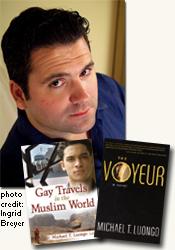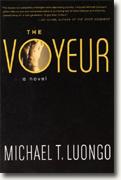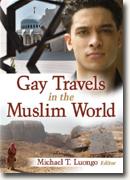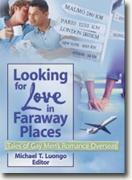author interview
book reviews:
· general fiction
· chick lit/romance
· sci-fi/fantasy
· graphic novels
· nonfiction
· audio books
· author interviews
· children's books @
curledupkids.com
· DVD reviews @
curledupdvd.com
newsletter
win books
buy online
links
home
for authors
& publishiss
for reviewers

|
|||||
 
Michael Leonard interviewed Michael T. Luongo,
author of
The Voyeur Interviewer Michael Leonard: While The Voyeur Michael T. Luongo: I think all writers have a bit of imagination no matter what they write. The fact of the matter is, and maybe this is a good lesson in persistence for all aspiring writers out there, I wrote The Voyeur The Voyeur Can it be candid and honest if it is fictional? But yes, it is drawn from my experiences working in the AIDS and HIV prevention research field in the USA and Europe. I felt a few things as I was writing The Voyeur The action in the novel jump-starts when a crazed man attacks Jason and he defends himself with a wooden penis. It's sort of funny and comical, and then the following newspaper article sets the tone for what is to come. Why did you decide to include this scene? And how were you able to balance the light-hearted moments with the some of the more serious issues that occur throughout? The idea of the wooden penis for Jason to defend himself comes from the fact that I actually did carry wooden penises in my pocket when I did this work because it was the only weapon I had. I just let the imagination run wild, as we writers are likely to do, to let nature take its course, in my mind. I mean it is a funny idea, and well it would be something that papers, especially tabloids, would take a hold of. As I mentioned above this, the work of HIV prevention is full of both comical and tragic moments. In one moment penises are rolling around the floor, another someone you have worked with has died.
By sex work, itís not prostitution, though that is a running joke in the novel, but sex research work. Jason has a clear need for approval and recognition. For many gay men, that can come from doing this type of work. Look at me, I am a martyr and mensch, putting other peopleís needs above my own, look at how I suffer for the community, but really he wants attention and recognition, so it is not entirely selfless. As well, he wanted to work in a gay environment, and AIDS, despite it not being solely a gay issue, clearly is a gay issue.
When Jason tells Mark that he's going to head the research project on the sexual behavior of gay men, Mark isn't supportive at all. Jason, however, thinks that Mark doesn't understand all the wonderful things he's doing for gay men in general. What do you think lies at the core of their conflict? Jasonís working on this project clearly hits too close to home for Mark, in terms of the type of gay men the project involves. As well, and this is part of martyr and mensch syndrome, Jason takes no time for his partner, itís all about him, though he says itís about working to improve the lives of all gay men. He ignores Markís needs in the relationship while he basks in all this glory. I mean, we all know about people who head charities and later hear stories that they were horrible to their families. That becomes the case with Jason, but his family, as a gay one, is himself and his lover. At one stage, Jason tells his mother that he's a hustler, and that he sleeps with a bunch of sleazy men. Why does Jason keep tantalizing his mother over the phone with such shocking statements, knowing all the while that she's really quite conservative? Why does anyone do what they do? I think it helps to also show his need for approval. He is never going to get it from his mother, but maybe he never did and that is why he seeks it in other ways, via the media, via other researchers. The scenes with his mother have a lot of humor, in my opinion, but they also get at the psychology of Jason, as well as drive the plot, because they help to reveal the process of his own thinking as well as the continuing evolution of his own projects. She is also in essence the Anne Bancroft character in this if you consider the relationship in Torch Song Trilogy. While Jason comes across as rather frustrated with his skewered priorities, you portray Ricky as an unadulterated party boy. Everyone jumps on the bandwagon when he suggests going to the sex clubs and porn theatres to interview the "captive audience." Do you think there's more to Ricky than meets the eye? Ricky is my favorite character and some people who have reviewed the book say he should have been the main character. Of course, it would clearly have been a different book then. Ricky is a sex addict with a brain, who uses his knowledge to help the project since his life has been one long, ongoing sex research project with a lot of subjects, as he explains. Ricky is someone I would like to be, or maybe half of what I am. He has fun but still gets his work done, and clearly is needed for the project, and stylistically, with his sense of humor, he is a wonderful foil to how uptight Jason can be. By placing the two together, I feel you really bring out the contrasts between the two characters as they react to the same environments. Ricky's idea of interviewing HIV positive men who are drawn to such anonymous sexual encounters in such places is a good one. But from your experiences in the real world, how difficult is it to realistically do this? You might be surprised! The reality is that within sex environments, a lot of pretension is already stripped away, whether youíre a janitor or a CEO, youíre naked and fucking, so right there is certain realness and a certain leveling of the field, which can lead to certain honesty. Obviously though not in all cases. Also, depending on the layout of a location, especially a bathhouse with individual rooms, one-on-one conversations can be possible, often more easily than in a bar or a pride event. Research also shows that a greater percentage of HIV+ sexually active men are in sexual settings versus non-sexual settings, which was the type of person being sought out in the course of the research in the novel. However, a group sex place is more difficult to do some recruiting. Jason has a frank discussion with Ricky about the nature of promiscuity and about the flawed research that is slanted towards rich gay men. Why do you think he is forced to talk so candidly to Ricky about this? I feel that what he is saying there is very true. Actually, the New York Times Magazine just had a thing about clinical trials and research and how people in trials are skewed a certain way, which makes trials have certain results. It is the same with HIV and sex research in the gay community, as well as any kind of research in the gay community, whatever the gay community is, of course!
When Jason starts going out in the field and cruising the train stations, he starts to feel that he is no longer the observer, but instead the observed; he then becomes like a frightened and paralyzed child. Why do you think Jason's childhood memories exhibit such a powerful force on him? Itís part of the mystery of sexuality and how he became what he is. We also, of course, and here I am giving away maybe too much, we learn he had done this all since childhood, and this is how it is manifesting itself into adulthood. Itís also a similar theme in some literature where the hunter becomes the hunted. There's a part of Jason that wants to become the next "It boy" and use the research project to get to the edge of what he wants. But what do you think it is that Jason actually wants? Jason wants recognition; he wants people to tell him how wonderful he is. He is not getting this with Mark, his boyfriend, and he never got it from his mother. Within AIDS and HIV prevention, as ugly as the disease is, there is an obvious glamour to it as well. I think this is also one of the disconnects. Elizabeth Taylor and AMFar and dresses and red carpets, and oh, by the way, there are some people dying, too, with lesions all over their body.
Itís both an issue of betrayal and also of having to admit to how his own behavior has impacted things. He is someone who, like the charity women who are mean to their families, canít connect to those closest to him. Sometimes also researchers canít see the obvious. And who wants to accept blame when things go wrong anyway? The Village Chelsea and the Meat Packing District are synonymous with gay life in New York. They are also the areas where a lot of AIDS education is conducted. Would you like to tell us a bit about the connection between AIDS and the homeless, transient and desperately poor? Things have changed tremendously within those areas and the Meatpacking District has virtually no gay associations left at all, itís full of Paris Hilton lookalikes running to the latest useless boutique. I talk about a time when Giuliani was shutting down anything gay or sex related within those areas, and now, with that and real estate values, the areas are totally different. Clearly having HIV can impact housing choices in many ways. Though much has changed with new drugs, people with HIV on disability canít work, need access to inexpensive housing, and need housing near social services. This is the reason for groups like Housing Works. The vast majority of social services in New York are in Manhattan.
It's interesting that when Jason asks Barbara, the manager of one of the gay bars, whether he can interview the clientele, she goes into denial, telling him that "these guys don't even know that much about HIV." How prevalent do you think these attitudes are? I think they are very prevalent. That is a fictional rewriting of something that actually occurred for me with a bar in Chelsea. You also have to remember that AIDS has also been sanitized. In the 1980s, you saw the images of people dying, with lesions and hollow faces. Now, you never see that. Partly it is because of advanced treatment, but people are still dying. Ironically, also, and this is something which is not well addressed, when fewer people die of AIDS and HIV, more people can become infected. This is among the reasons why the HIV rate continues to climb. By the end of the novel, how has Jason's attitudes to the people he loves Ė particularly that of Mark and his mother - changed? He realizes he has been ignoring Mark all along, and maybe does not deserve him. He also realizes maybe he never needed his motherís approval anyway. The novel does end unresolved in that sense, but we realize Jason has made this personal discovery. Maybe, though, he wonít have anything he had before. We donít really know. In the acknowledgments section you make a comment about Rudy Giuliani. Nationally, he comes across as a rather liberal Republican, but you portray him as quite ruthless. For those of us who don't live in New York, can you tell us a bit about the kind policies he instituted that so raised the ire of AIDS workers? I shudder to think what the United States would be like if he were elected President. I sometimes call him the long lost lovechild of a hidden relationship between Eva Braun and Mussolini. As an Italian American, he also embodies the worst characteristics of outer borough Italian Americans that I despise.
Sex also plays a large part in Gay Travels in the Muslim World In a nutshell, it was 9-11, and the subsequent wars. I did find, though, that when I put together Between the Palms, a collection of gay travel erotica stories, the contract of which I first laid eyes on the morning of 9-11, I realized that there was a strong interest in doing this kind of book. Up to a third of the stories submitted for that collection took place in Muslim countries, or were about men who met men from Muslim countries on their trips to Europe for example.
Gay is a very Western concept, and a very recent one. Within Islamic countries, homosexuality and same-sex love was always seen as normal. Itís quite celebrated in poetry and literature, and you can find diaries explaining how shocked Middle Eastern diplomats were by how shocked Europeans, even in France, were about homosexual behavior. The problem is that those Western attitudes permeated the Middle East and got stuck in this Victorian timeframe. At the same time, the notion of doing is being Ė that having same sex relations identifies and separates you from the general population - is Western.
Your story ďAdventures in AfghanistanĒ is one of the most enlightening and surprising. It also shows that you took some risks. What was it really like to walk the dusty streets of Kabul and get yourself involved in a gay Afghan party? Well, Kabul is an amazing city. People are extremely welcoming of foreigners. One thing in general in all Muslim countries, which we as a Christian society (and America is a Christian society) is that hospitality and welcoming strangers is integral to Islamic culture. After all, itís a religion of the desert; you must help your fellow man. People commonly greeted me and said hello, invited me for tea, with shouts of ďchai, chai,Ē it is something quite unforgettable actually, this welcoming.
This idea of giving sex for money, and the fact that so many men are open to the possibilities of sexual exchange in these countries, is shocking. But none of these men would ever identify themselves as gay. How do you think their behavior would be viewed by the wider society? Well, exchange of sex for money is not as common as people think at all, and it is not a common theme in the book, either. There are a few stories where that happens, but not most of them. One thing to remember is that as a foreigner, you do have a lot more money and resources than most people in the places youíre visiting. As well, Shariah law, or Islamic law, even if in theory Ė and I am not a religious expert Ė might ban sex between men, it also has a component that says nothing happens if there are not 4 witnesses, so really anyone can do whatever he or she wants to do, as long as there are no witnesses. This applies to sex between men, to rape of women, unfortunately, to adultery, to all kind of sexual behaviors. Sexual fluidity is a theme that is frequently touched upon. People in these societies seem to move easily between sexes, male-to-male and male to female, with little bother. Do you think it has always been this way in these societies? It was once this way in our society. What changed it is the creation of the word homosexual, and eventually the gay rights movement causing a social separation between people based on with whom they slept. If you listen to older gay people, they complain that at one time, they could have sex with anybody until gay rights came along, making people choose to define themselves. So this fluidity is really normal, and is still within these societies. Of course, the separation of people by sex, men not socializing with women, depending on the country, makes it all the more like this, too. Do you think the Muslim world will ever see a modern gay rights movement? It has a gay rights movement. It has it in exile in Europe and the USA where Iraq and Iran are concerned, but it also has it in Turkey, Jordan, Egypt and some other countries. A wonderful resource for learning more about that is with www.globalgayz.com, the website of Richard Ammon who wrote a story in the collection. The stories are set from Morocco to Mauritania, to Oman, and then on to Bangladesh, Turkey and Saudi Arabia, but what story Ė and by association, what country - most resonates with you? Afghanistan really resonates with me. I would love to live there if I could ever work it out to be the case. I also really love Turkey - the men are so handsome and Istanbul is an eternal city of its own, like an Islamic Rome. I also really enjoyed Jordan. It was a place where one can also experience in a safe way meeting people from both Iraq and Palestine who are refugees rebuilding their lives from the Iraq War and also the turmoil of Palestine that remains unresolved nearly 60 years later. Familial tradition is something that also resonates throughout. It is expected that Muslim men should marry and have children; usually by the time they're thirty. How do you think they would view our Western lives, where independence from one's family and making one's own way in the world is encouraged and even prided on? It is seen as strange. It does make it obvious to some that we are indeed gay men, but I do remember that many of the men I know in Afghanistan, knowing that I am gay, knowing what I am, still wonder why I donít want to get married and have children. Itís not that we donít have those examples in the West, particularly among ethnic groups here, such as even Italian Americans who live at home for forever, or Jewish boys who are stereotypical mamaís boys, as well as within Latin cultures where the family is everything, and unlike white gay men who move out of suburban communities away from the family, Latino gay men often have to build their gay lives within their own greater community.
In the most of the stories, these Muslim men coexist with poverty in beautiful lands that inspire excesses. How does this reality affect family connections and priorities? How does family connect people who have so little in worldly goods? We have so much in this country, but really we donít have anything. I was just at my parents in the suburbs, a land of malls and Wal-Mart, but really what is that? It does not make people closer. I find the happiest people tend to have the fewest things. More cars, I-Pods, computers, etc. donít make people happy, we become slaves to things. They say Americans are happy, but I think when I am overseas, the most miserable places often have the simplest easiest forms of happiness, because a lack of things brings people closer together. Can you speak a bit about the fusion of homosexuality with some of the conflicts that have been going on in the world at large post 9/11 and how the ongoing, brutal war in places like Iraq and Afghanistan affects the everyday lives of the people in the stories? When I speak with people about the book, I remind them also of some the things blending with homosexuality, which have been part of the discussion since 9-11, and these things are also in the book. First among them is Mohammed Atta, one of the men who flew a plane into the Twin Towers. There was some discussion that he might have been gay and needed to prove his masculinity to his father and that is what made him a terrorist.
Gay Travels in the Muslim World For Gay Travels in the Muslim World Do you have any favorite authors, writers that you call upon for inspiration when you are writing? You know, I really enjoyed Larry Kramerís Faggots and the way he calls upon Jewish angst in his writings, the neuroticism of family. I believe some of that is reflected in
The Voyeur And finally, now that you have written your first work of fiction, and have successfully published nonfiction travel writing, would you like to share with us some of the details about what is next on your agenda? Well, I have to be honest, I want to travel less and freelance less. I want to write some larger projects. Gay Travels in the Muslim World Michael T. Luongo is a freelance writer and photographer living in New York. His credits include the New York Times, Bloomberg News, Conde Nast Traveler, National Geographic Traveler, the Advocate, PlanetOut and many other gay and mainstream publications. Michael Leonard is a freelance writer and contributing reviewer to curledup.com. His interview with Michael T. Luongo was written in conjunction with his reviews of The Voyeur and Gay Travels in the Muslim World. © Michael Leonard/2007.
|
|||||
| fiction · sf/f · comic books · nonfiction · audio newsletter · free book contest · buy books online review index · links · · authors & publishiss reviewers |
|
| site by ELBO Computing Resources, Inc. | |



